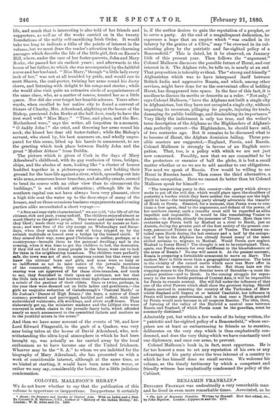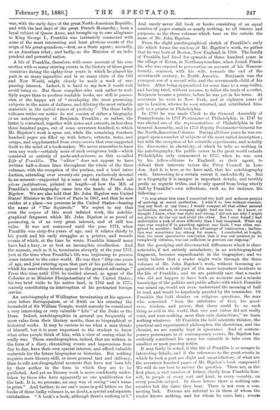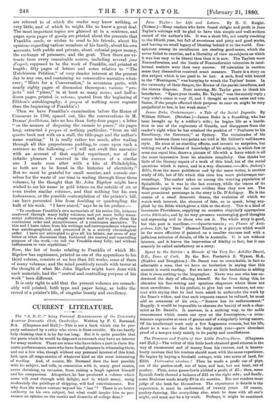BENJAMIN FRANKLIN.*
BENJAHIN FRANKLIN was undoubtedly a very remarkable man and he lived in even more remarkable times. Associated., as he * Vie We of Benjamin Franklin. Written by Himself. Now first edited, eee., by John Bigelow. London : Lippincott and Co. 1879.
was, with the early days of the great North-American Republic, and with the last days of the great French Monarchy ; born a loyal subject of Queen Anne, and brought up to owe allegiance
to King George I., Franklin was intimately connected with some of the most interesting and least glorious events of the
reign of his great-grandson,—first, as a State agent; secondly, -as an American rebel ; and lastly, as the Minister of an inde- pendent and powerful nation.
A life of Franklin, therefore, with some account of his con- nection with so many stirring events in the history of three great countries during the eighty-four years in which he played his part in so many capacities and in so many cities of the Old and New World, might clearly be made a work of sur-
passing interest. Indeed, it is hard to say how it could well s,void being so. But those compilers who seek rather to mul-
tiply pages than to produce readable books, are still in posses- sion of the happy art of "enveloping the most promising subjects in the mists of dullness, and diluting the most valuable materials in the turbid waters of prolixity." The three bulky
-volumes under our notice do not consist of either a biography 4:n. an autobiography of Benjamin Franklin ; or rather, the
latter is contained, together with notes and extracts, in less than three hundred pages, out of some seventeen hundred, to which Mr. Bigelow's work is spun out, while the remaining fourteen hundred pages are filled up with letters, extracts, notes, and scraps, and supplemented from every source that ever suggested itself to the mind of a book-maker. We never remember to have seen any work—certainly none of such overgrown bulk—which
'consisted so entirely of paste-and-scissors, as this so-called Life of Franklin. The " editor " does not appear to have written half-a-dozen lines throughout the whole of the three volumes, with the exception of the preface, and a brief intro- duction, extending over seventy-six pages, exclusively devoted to an amount—supported by a mass of what the French call pieces justificatives, printed at length—of how the MS. of
Franklin's autobiography came into the hands of Mr. John Bigelow. We are also told that Mr. John Bigelow was United States' Minister to the Court of Paris in 1867, and that he now resides at a place—we presume in the United States—bearing the name of "The Squirrels." We regret to say that
sven the corpus of this most inflated work, the autobio-
graphical fragment which Mr. John Bigelow is so proud of possessing, is of no very great interest, and of still less -value. It was not composed until the year 1771, when Franklin was sixty-five years of age, and it relates chiefly to his youth and his early struggles as a printer, and records -events of which, at the time he wrote, Franklin himself must have had a hazy, or at best an incomplete recollection. And the memoir, such as it is, terminates abruptly at the year 1757, just at the time when Franklin's life was beginning to possess some interest to the outer world. He was then "fifty-one years of age, and just entering upon that part of his public career in which his marvellous talents appear to the greatest advantage."
From this time until 1785 he resided abroad, as agent of the Colonies or as Minister Plenipotentiary of the United States ; his two brief visits to his native land, in 1762 and in 1775, scarcely constituting an interruption of his protracted foreign service.
An autobiography of Wellington terminating at his appear- ance before Seringapatam, or of Swift on his entering the household of Sir William Temple, would scarcely be considered a very interesting or very valuable " Life " of the Duke or the Dean. Indeed, autobiographies in general are frequently of more value from their literary merits, than as biographical or historical works. It may be curious to see what a man thinks of himself, but it is more important to the student to know what other people think of him, with a view of seeing what he really was. Those autobiographies, indeed, that are written in the form of a diary, chronicling events and impressions from day to day, have their own special interest, and afford valuable materials for the future biographer or historian. But nothing requires more literary skill, or more general tact and delicacy, than to edit autobiographical memoirs that have not been left by their author in the form in which they are to be published. And yet no literary work is more confidently under- taken by those who have apparently no one qualification for the task. It is, we presume, an easy way of seeing "one's name in print." And further, to see one's name in gold letters on the backs of three bulky volumes is, no doubt, a special and separate satisfaction. "A book's a book, although there's nothing in't." And surely never did book or books consisting of an equal number of pages contain so nearly nothing, to all intents and purposes, as the three volumes which bear on the outside the name of Mr. John Bigelow.
From the slight autobiographical sketch of Franklin's early life which forms the nucleus of Mr. Bigelow's work, we gather that he was born at Boston, New England, in 1706. The family of Franklin had lived for upwards of three hundred years in the village of Ecton, in Northamptonshire, when Josiah Frank- lin, who was exposed to persecution on account of his Noncon- formity, removed, with his wife, towards the end of the seventeenth century, to North America. Benjamin was the youngest son of a second wife, and the seventeenth child of his father. After being apprenticed for some time to a soap-boiler, and having tried, without success, to follow the trade of a cutler, Benjamin became a printer, before he was yet in his teens. At seventeen he went to New York, and at eighteen years of age to London, whence he soon returned, and established him- self as a printer in Philadelphia.
In 1736 he was made Clerk to the General Assembly of
Pennsylvania, in 1737 Postmaster of Philadelphia, in 1'747 he was elected one of the representatives of Philadelphia in the
General Assembly, and in 1753 Deputy Postmaster-General for the North-American Colonies. During all these years he was en- gaged upon a number of subjects of the most varied description ; but with the exception of his scientific experiments, and notably his discoveries in electricity, of which he tells us nothing in his autobiography, his public career in the great world outside Philadelphia only commenced in 1757, when he was sent by his fellow-citizens to England, as their agent, to defend their interests before the Privy Council in Lon- don. And it is here, as we have said, that his autobiography ends. Interesting to a certain extent it undoubtedly is. But as a biography it is meagre in important details, and terribly
prolix as regards trifles, and is only spared from being utterly dull by Franklin's own reflections, such as, for instance, the following :— "It was about this time I conceived the bold and arduous project of arriving at moral perfection. I wish'd to live without commit- ting any fault at any time; I would conquer all that either natural inclination, custom, or company might lead me into. As I knew, or thought I knew, what was right and wrong, I did not see why I might not always do the one and avoid the other. But I soon found I had undertaken a task of more difficulty than I had imagined. While my care was employ'd in guarding against one fault, I was often sur- prised by another ; habit took the advantage of inattention ; inclina- tion was sometimes too strong for reason. I concluded, at length, that the mere speculative conviction that it was our interest to be completely virtuous, was not sufficient to prevent our slipping."
But the gossiping and disconnected diffuseness which is char- acteristic, if not entirely satisfactory, in an autobiographical fragment, becomes unpardonable in the biographer; and we verily believe that a reader might wade through the three volumes of Mr. John Bigelow's work, without becoming ac- quainted with a tenth part of the more important incidents in the life of Franklin ; and we are perfectly sure that a reader who did not happen to have both an accurate and a minute knowledge of the politics and public affairs with which Franklin was mixed up, would not even understand the meaning of half he read, and would be hopelessly puzzled by the remainder. Of Franklin the bold thinker on religious questions, the man who conceived "from the attributes of God, his good- ness, wisdom, and power, that there could be no such thing as evil in the world, that vice and virtue did not really exist, and were nothing more than vain distinctions," we learn nothing whatever. Of Franklin the bold scientific thinker, the practical and experimental philosopher, the electrician, and the chemist, we are equally kept in ignorance. And of contem- porary personages or of contemporary events, Mr. Bigelow has evidently considered his space too valuable to take even the smallest or most passing notice. It may fairly be asked, if this life of Franklin is so meagre in interesting details, and if the references to the great events in which he took a part are slight and unsatisfactory, of what are the seventeen hundred pages of Mr. Bigelow's book composed ? We will do our best to answer the question. There are, in the first place, a vast number of letters, chiefly from Franklin him- self, to people of every sort and kind, in every country, on every possible subject. In these letters there is nothing con- secutive but the dates they bear. There is not even a con- necting link. Persons are referred to in them of whom the reader knows nothing, and for whom he cares less ; events are referred to of which the reader may know nothing, or very little, and of which he might like to know a great deal. The most important topics are glanced at in a sentence, and pages upon pages of gossip are printed about the presents that Franklin sends, or wishes to send to his friends, about his opinions regarding various members of his family, about his own
accounts, both public and private, about colonial paper money, the exchange of prisoners, and the gout. Then there are ex- tracts from every conceivable source, including several jeux d'esprit, supposed to be the work of Franklin, and printed at length ; fifty pages of letters and notes relative to "The Hutchinson Petition," of very slender interest at the present day to any one, and containing no consecutive narrative what- ever ; "Hints for a Conversation," in seventeen parts, with nearly eighty pages of discussion thereupon; various " pro- jects " and "plans," in at least as many more; and half-a- dozen pages, printed in =tens°, quoted from the beginning of Gibbon's autobiography, a propos of nothing more cognate than the beginning of Franklin's Then we have Franklin's examination before the House of Commons in 1766, spaced out, like the conversations in M. Dumas' feuillelons, into no less than forty-four pages ; a letter "on the nseanes of disposing the enemie to peace," six pages long, extracted a propos of nothing particular, "from an old quarto book met with on a stall, the title-page and the author's name wanting." It is really rather too much, after wading through all this preposterous padding, to come upon such a sentence as the following :—" I will not swell this narrative with an account of that capital experiment, nor of the infinite pleasure I received in the success of a similar one I made soon after with a kite at Philadelphia, as both are to be found in the histories of electricity." But we must be grateful for small mercies, and console our- selves for the waste of our time in wading through these three volumes, by the thought that Mr. John Bigelow might have
wished to see his name in gold letters on the outside of six or even twelve similar volumes, and that nothing but his own forbearance, or the possible contemplation of the printer's bill, can have prevented him from doubling or quadrupling the bulk of his work. "I have aimed," says he in his preface:—
"To condense Franklin's own memorials of his entire life, hitherto scattered through many balky volumes, and yet more bulky manu- script collections, into a single compact work, and to give them the convenient order and attractiveness of a continuous narrative. To this end I have taken from his writings and correspondence whatever was autobiographical, and presented it in a strictly chronological order. I have not attempted to give all his letters, nor more of any letter or other document than furthered the central and controlling purpose of the work,—to tell the Franklin story fully, and without tediousness or vain repetitions."
Now, the list of books relating to Franklin of which Mr. Bigelow has cognisance, printed as one of the appendices to his third volume, consists of no less than 165 works, some of them of many volumes; and the mind positively recoils with terror at the thought of what Mr. John Bigelow might have done with such materials, had the "central and controlling purpose of his work" been different.
It is only right to add that the present volumes are remark- ably well printed, both type and _paper being, as befits the record of a printer's life, of singular beauty and excellence.




































 Previous page
Previous page